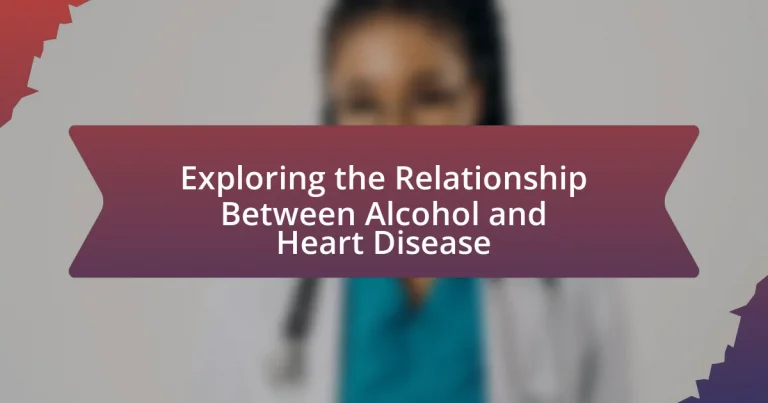The article explores the complex relationship between alcohol consumption and heart disease, highlighting how moderate intake may offer protective effects while excessive consumption significantly increases cardiovascular risks. It details the physiological impacts of alcohol on heart health, including its effects on blood pressure and heart rate, and distinguishes between different types of alcohol consumption, such as moderate drinking, heavy drinking, and binge drinking. The article emphasizes the importance of moderation, outlines the risk factors associated with alcohol and heart disease, and discusses how individual variability, lifestyle factors, and genetic predispositions can influence this relationship. Additionally, it provides practical tips for managing alcohol consumption to protect heart health and underscores the role of healthcare professionals in monitoring and advising on alcohol intake.

What is the relationship between alcohol and heart disease?
Alcohol consumption has a complex relationship with heart disease, where moderate intake may offer some protective effects, while excessive consumption significantly increases the risk of cardiovascular problems. Studies indicate that moderate alcohol consumption, defined as up to one drink per day for women and up to two drinks per day for men, is associated with a lower risk of coronary artery disease due to its potential to raise high-density lipoprotein (HDL) cholesterol and reduce blood clot formation. Conversely, heavy drinking is linked to hypertension, cardiomyopathy, and arrhythmias, contributing to a higher incidence of heart disease. According to the American Heart Association, excessive alcohol intake can lead to heart failure and stroke, underscoring the importance of moderation in alcohol consumption for heart health.
How does alcohol consumption impact heart health?
Alcohol consumption can have both positive and negative impacts on heart health. Moderate alcohol intake, defined as up to one drink per day for women and up to two drinks per day for men, has been associated with a lower risk of coronary heart disease due to its potential to increase high-density lipoprotein (HDL) cholesterol and reduce blood clot formation. However, excessive alcohol consumption can lead to high blood pressure, cardiomyopathy, and an increased risk of heart failure and stroke. According to the American Heart Association, heavy drinking is linked to a higher incidence of heart disease, emphasizing the importance of moderation in alcohol consumption for maintaining heart health.
What are the physiological effects of alcohol on the cardiovascular system?
Alcohol consumption has several physiological effects on the cardiovascular system, including alterations in heart rate, blood pressure, and overall heart function. Acute alcohol intake can lead to increased heart rate and blood pressure due to its stimulatory effects on the sympathetic nervous system. Chronic consumption, however, is associated with cardiomyopathy, arrhythmias, and hypertension, which can increase the risk of heart disease. Research indicates that heavy drinking can lead to structural changes in the heart, such as left ventricular hypertrophy, and can contribute to the development of atrial fibrillation. Studies have shown that individuals who consume alcohol excessively are at a higher risk for cardiovascular events, reinforcing the link between alcohol and heart disease.
How does alcohol influence blood pressure and heart rate?
Alcohol consumption can lead to increased blood pressure and elevated heart rate. Specifically, moderate to heavy drinking can cause temporary spikes in blood pressure due to the stimulating effects of alcohol on the cardiovascular system. Research indicates that acute alcohol intake can raise systolic blood pressure by an average of 2 to 4 mmHg and diastolic blood pressure by 1 to 2 mmHg shortly after consumption. Additionally, chronic alcohol use is associated with long-term hypertension and can lead to persistent increases in heart rate, as the heart works harder to pump blood. Studies have shown that individuals who consume alcohol regularly may experience a higher resting heart rate, which can be a risk factor for cardiovascular diseases.
What are the different types of alcohol consumption?
The different types of alcohol consumption include moderate drinking, heavy drinking, binge drinking, and abstinence. Moderate drinking is defined as up to one drink per day for women and up to two drinks per day for men, which is associated with certain health benefits, including potential cardiovascular advantages. Heavy drinking involves consuming more than the moderate limits, often leading to negative health outcomes. Binge drinking is characterized by consuming a large quantity of alcohol in a short period, typically five or more drinks for men and four or more for women within about two hours, which can significantly increase the risk of heart disease and other health issues. Abstinence refers to not consuming alcohol at all, which eliminates any risk associated with alcohol consumption. These classifications help in understanding the varying impacts of alcohol on health, particularly in relation to heart disease.
How do moderate and excessive drinking differ in their effects on heart disease?
Moderate drinking can have protective effects against heart disease, while excessive drinking significantly increases the risk of developing cardiovascular issues. Research indicates that moderate alcohol consumption, defined as up to one drink per day for women and up to two drinks per day for men, may improve heart health by raising high-density lipoprotein (HDL) cholesterol levels and reducing blood clot formation. In contrast, excessive drinking, characterized by binge drinking or chronic heavy drinking, is associated with hypertension, cardiomyopathy, and arrhythmias, leading to a higher incidence of heart disease. According to the American Heart Association, heavy alcohol consumption can lead to a 1.5 to 2 times greater risk of heart disease compared to moderate consumption.
What role does binge drinking play in cardiovascular health?
Binge drinking significantly increases the risk of cardiovascular health issues. Research indicates that excessive alcohol consumption, defined as binge drinking, can lead to hypertension, arrhythmias, and cardiomyopathy. A study published in the Journal of the American College of Cardiology found that individuals who engage in binge drinking are 1.5 times more likely to develop heart disease compared to moderate drinkers. Additionally, binge drinking can cause acute inflammation and oxidative stress, which further contribute to cardiovascular damage.
Why is it important to understand the alcohol-heart disease connection?
Understanding the alcohol-heart disease connection is crucial because it informs public health strategies and individual lifestyle choices that can significantly reduce the risk of cardiovascular diseases. Research indicates that excessive alcohol consumption is linked to high blood pressure, cardiomyopathy, and arrhythmias, which are major contributors to heart disease. For instance, a study published in the Journal of the American College of Cardiology found that individuals who consume more than two alcoholic drinks per day have a 50% higher risk of developing heart disease compared to moderate drinkers. This knowledge enables healthcare providers to offer tailored advice and interventions, ultimately improving patient outcomes and promoting heart health.
What are the potential risks of ignoring this relationship?
Ignoring the relationship between alcohol consumption and heart disease can lead to significant health risks, including increased likelihood of cardiovascular events. Research indicates that excessive alcohol intake is associated with hypertension, cardiomyopathy, and arrhythmias, which can ultimately result in heart failure or stroke. For instance, a study published in the Journal of the American College of Cardiology found that individuals consuming more than two drinks per day had a 50% higher risk of developing heart disease compared to moderate drinkers. Therefore, neglecting this relationship can exacerbate existing health issues and contribute to the development of serious cardiovascular conditions.
How can awareness of this connection influence public health policies?
Awareness of the connection between alcohol consumption and heart disease can significantly influence public health policies by guiding the development of targeted interventions and regulations. For instance, recognizing that excessive alcohol intake is a risk factor for cardiovascular diseases can lead policymakers to implement stricter alcohol advertising regulations, promote educational campaigns about safe drinking limits, and allocate resources for screening and treatment programs for alcohol use disorders. Evidence from studies, such as the one published in the Journal of the American College of Cardiology, indicates that reducing alcohol consumption can lower the incidence of heart disease, thereby supporting the need for policies that encourage healthier lifestyle choices.

What are the risk factors associated with alcohol and heart disease?
The risk factors associated with alcohol and heart disease include high blood pressure, irregular heartbeats, cardiomyopathy, and increased triglyceride levels. Chronic alcohol consumption can lead to hypertension, which is a significant risk factor for heart disease, as it places extra strain on the heart and blood vessels. Additionally, excessive alcohol intake can cause cardiomyopathy, a condition where the heart muscle weakens, impairing its ability to pump blood effectively. Irregular heartbeats, or arrhythmias, can also arise from alcohol use, increasing the risk of stroke and other cardiovascular complications. Furthermore, alcohol can elevate triglyceride levels, contributing to the development of atherosclerosis, which narrows arteries and increases the risk of heart attacks.
How does individual variability affect the relationship between alcohol and heart disease?
Individual variability significantly influences the relationship between alcohol consumption and heart disease risk. Factors such as genetics, sex, age, and pre-existing health conditions can alter how alcohol affects cardiovascular health. For instance, genetic variations in alcohol metabolism can lead to different levels of acetaldehyde, a toxic byproduct of alcohol, which has been linked to increased heart disease risk in some populations. Additionally, studies indicate that women may experience more adverse cardiovascular effects from alcohol than men due to differences in body composition and hormonal factors. Research published in the Journal of the American College of Cardiology shows that moderate alcohol consumption may have protective effects for some individuals, while excessive intake consistently increases heart disease risk across various demographics. Thus, individual differences play a crucial role in determining the impact of alcohol on heart health.
What genetic factors may influence susceptibility to alcohol-related heart issues?
Genetic factors that may influence susceptibility to alcohol-related heart issues include variations in genes associated with alcohol metabolism, such as ADH1B and ALDH2. Individuals with specific alleles of these genes may experience different rates of alcohol breakdown, leading to increased toxicity and cardiovascular stress. For instance, the ALDH2*2 allele is prevalent in East Asian populations and is linked to a higher risk of hypertension and heart disease when consuming alcohol, as it results in the accumulation of acetaldehyde, a toxic byproduct of alcohol metabolism. Studies have shown that individuals with this genetic variant are more likely to develop alcohol-related cardiovascular problems, highlighting the significant role of genetic predisposition in this context.
How do age and gender play a role in this relationship?
Age and gender significantly influence the relationship between alcohol consumption and heart disease. Research indicates that older adults are more susceptible to the adverse effects of alcohol on heart health, as aging can exacerbate the risks associated with alcohol, such as hypertension and cardiomyopathy. Additionally, gender differences exist, with studies showing that men generally experience a higher risk of alcohol-related heart disease compared to women, partly due to differences in body composition and metabolism. For instance, the American Heart Association notes that excessive alcohol intake can lead to increased blood pressure and heart rhythm problems, which are more pronounced in older males.
What lifestyle factors can exacerbate the risks of alcohol on heart health?
Sedentary lifestyle, poor diet, smoking, and high stress levels can exacerbate the risks of alcohol on heart health. A sedentary lifestyle reduces cardiovascular fitness, making the heart more vulnerable to the negative effects of alcohol. Poor dietary choices, particularly those high in saturated fats and sugars, can lead to obesity and hypertension, which compound the risks associated with alcohol consumption. Smoking introduces additional toxins that can damage blood vessels and increase heart disease risk, further amplifying the harmful effects of alcohol. High stress levels can lead to unhealthy coping mechanisms, including increased alcohol intake, which can negatively impact heart health. Studies indicate that these lifestyle factors collectively contribute to a higher incidence of heart disease among individuals who consume alcohol.
How do diet and exercise interact with alcohol consumption regarding heart disease?
Diet and exercise significantly influence the effects of alcohol consumption on heart disease risk. A balanced diet rich in fruits, vegetables, whole grains, and healthy fats can mitigate some of the harmful effects of alcohol, while regular exercise enhances cardiovascular health and can offset alcohol’s negative impacts. Research indicates that excessive alcohol intake is linked to hypertension and cardiomyopathy, but when combined with a healthy lifestyle, the risks can be reduced. For instance, a study published in the Journal of the American College of Cardiology found that individuals who maintained a healthy diet and exercised regularly had a lower incidence of heart disease, even with moderate alcohol consumption. This demonstrates that diet and exercise play a crucial role in moderating the relationship between alcohol and heart disease.
What is the impact of smoking on the alcohol-heart disease connection?
Smoking significantly exacerbates the negative effects of alcohol consumption on heart disease. Research indicates that both smoking and alcohol independently contribute to cardiovascular risk factors, such as hypertension and atherosclerosis. When combined, the risks are multiplicative; for instance, a study published in the Journal of the American College of Cardiology found that smokers who consume alcohol are at a higher risk for coronary artery disease compared to non-smokers who drink. This synergistic effect is attributed to smoking’s role in promoting inflammation and oxidative stress, which are already heightened by alcohol intake, leading to increased damage to the cardiovascular system.
What are the long-term consequences of alcohol misuse on heart health?
Long-term alcohol misuse significantly increases the risk of developing various heart health issues, including hypertension, cardiomyopathy, and arrhythmias. Chronic consumption of alcohol can lead to elevated blood pressure, which is a major risk factor for heart disease; studies indicate that individuals who consume excessive alcohol are more likely to experience sustained hypertension. Additionally, alcohol misuse can cause cardiomyopathy, a condition where the heart muscle weakens, leading to heart failure; research shows that about 10% of heart failure cases are attributed to alcohol-related cardiomyopathy. Furthermore, alcohol can disrupt the heart’s electrical system, resulting in arrhythmias, which can be life-threatening. These consequences underscore the detrimental impact of alcohol misuse on heart health.
How does chronic alcohol consumption lead to specific heart conditions?
Chronic alcohol consumption leads to specific heart conditions primarily through mechanisms such as increased blood pressure, cardiomyopathy, and arrhythmias. Prolonged intake of alcohol can elevate blood pressure, which is a significant risk factor for heart disease. Additionally, excessive alcohol can cause alcoholic cardiomyopathy, a condition where the heart muscle weakens, impairing its ability to pump blood effectively. Furthermore, chronic alcohol use can disrupt the electrical signals in the heart, leading to arrhythmias, which can increase the risk of stroke and heart failure. Studies indicate that individuals consuming more than three drinks per day are at a higher risk for these conditions, highlighting the direct correlation between alcohol intake and heart health.
What are the signs and symptoms of alcohol-related heart disease?
The signs and symptoms of alcohol-related heart disease include arrhythmias, cardiomyopathy, high blood pressure, and heart failure. Arrhythmias manifest as irregular heartbeats, while cardiomyopathy refers to the weakening of the heart muscle, which can lead to decreased heart function. High blood pressure is often a result of excessive alcohol consumption, contributing to the risk of heart disease. Heart failure may present as fatigue, shortness of breath, and swelling in the legs or abdomen. These symptoms are linked to chronic alcohol use, which has been shown to adversely affect cardiovascular health.

How can individuals manage their alcohol consumption to protect heart health?
Individuals can manage their alcohol consumption to protect heart health by adhering to recommended guidelines, which suggest limiting intake to no more than one drink per day for women and two drinks per day for men. Research indicates that excessive alcohol consumption is linked to increased risks of hypertension, cardiomyopathy, and arrhythmias, all of which can adversely affect heart health. Furthermore, individuals should consider alcohol-free days each week and monitor their drinking patterns to ensure they remain within these limits, as studies show that moderation can help mitigate the risks associated with alcohol and cardiovascular diseases.
What guidelines should be followed for safe alcohol consumption?
To ensure safe alcohol consumption, individuals should adhere to the guideline of limiting intake to moderate levels, defined as up to one drink per day for women and up to two drinks per day for men. This moderation helps reduce the risk of alcohol-related health issues, including heart disease. Research indicates that excessive alcohol consumption can lead to hypertension, cardiomyopathy, and arrhythmias, which are detrimental to heart health. Therefore, following these consumption limits is crucial for maintaining cardiovascular well-being.
How can individuals determine their personal limits for alcohol intake?
Individuals can determine their personal limits for alcohol intake by assessing their physical health, understanding their tolerance levels, and consulting guidelines from health organizations. Health professionals recommend that individuals consider factors such as age, weight, gender, and any existing medical conditions, as these can influence how alcohol affects the body. For instance, the Centers for Disease Control and Prevention (CDC) defines moderate drinking as up to one drink per day for women and up to two drinks per day for men. Additionally, individuals should monitor their own reactions to alcohol, noting any adverse effects or changes in behavior, which can indicate when they have reached their personal limit.
What strategies can help reduce alcohol consumption effectively?
Effective strategies to reduce alcohol consumption include setting clear goals, tracking intake, and seeking social support. Setting specific, measurable goals helps individuals understand their limits and stay accountable. Tracking alcohol consumption through apps or journals provides insight into drinking patterns, which can motivate change. Additionally, engaging with supportive friends or groups can create a positive environment that encourages moderation. Research indicates that individuals who set goals and monitor their drinking are more likely to reduce their alcohol intake successfully, as evidenced by a study published in the Journal of Substance Abuse Treatment, which found that goal-setting and self-monitoring significantly decreased alcohol consumption among participants.
What role does medical advice play in managing alcohol intake?
Medical advice plays a crucial role in managing alcohol intake by providing personalized recommendations based on individual health conditions and risks. Healthcare professionals assess factors such as a person’s medical history, current medications, and potential interactions with alcohol, which can significantly influence heart health. For instance, the American Heart Association advises that excessive alcohol consumption can lead to high blood pressure and cardiomyopathy, emphasizing the importance of moderation or abstinence for individuals with existing heart conditions. Therefore, medical guidance is essential for making informed decisions about alcohol consumption to mitigate risks associated with heart disease.
How can healthcare professionals assist in monitoring alcohol consumption?
Healthcare professionals can assist in monitoring alcohol consumption by implementing regular screening and assessment tools, such as the Alcohol Use Disorders Identification Test (AUDIT). These tools help identify individuals at risk of alcohol-related problems, enabling healthcare providers to offer tailored interventions. Research indicates that early identification and intervention can significantly reduce alcohol consumption and its associated health risks, including heart disease. For instance, a study published in the Journal of the American College of Cardiology found that reducing alcohol intake can lead to improved cardiovascular health outcomes.
What resources are available for individuals seeking help with alcohol-related issues?
Individuals seeking help with alcohol-related issues can access various resources, including support groups, treatment programs, and hotlines. Organizations such as Alcoholics Anonymous (AA) provide peer support through meetings and a 12-step recovery program, which has been effective for many individuals in overcoming alcohol dependence. Additionally, the Substance Abuse and Mental Health Services Administration (SAMHSA) offers a national helpline that connects individuals to local treatment facilities and support services. Research indicates that structured treatment programs can significantly reduce alcohol consumption and improve overall health outcomes, particularly in relation to heart disease, as excessive alcohol intake is linked to increased cardiovascular risks.
What practical tips can help maintain heart health while consuming alcohol?
To maintain heart health while consuming alcohol, individuals should limit their intake to moderate levels, defined as up to one drink per day for women and up to two drinks per day for men. This moderation helps reduce the risk of high blood pressure and heart disease, as excessive alcohol consumption is linked to these conditions. Additionally, choosing lower-calorie alcoholic beverages can help manage weight, which is crucial for heart health. Research indicates that excessive weight can lead to increased heart disease risk factors, such as diabetes and hypertension. Staying hydrated by drinking water alongside alcoholic beverages can also mitigate the negative effects of alcohol on the heart.
How can individuals balance social drinking with heart health considerations?
Individuals can balance social drinking with heart health considerations by adhering to moderate drinking guidelines, which recommend up to one drink per day for women and up to two drinks per day for men. This moderation helps minimize the risk of heart disease, as excessive alcohol consumption is linked to high blood pressure, cardiomyopathy, and arrhythmias. Research from the American Heart Association indicates that moderate alcohol intake may even provide some cardiovascular benefits, such as increased HDL cholesterol levels. Therefore, individuals should be mindful of their consumption, choose lower-alcohol options, and prioritize non-alcoholic beverages during social events to maintain heart health while enjoying social interactions.
What lifestyle changes can complement responsible alcohol consumption for better heart health?
Regular physical activity, a balanced diet, and stress management can complement responsible alcohol consumption for better heart health. Engaging in at least 150 minutes of moderate aerobic exercise weekly can lower the risk of heart disease by improving cardiovascular fitness and reducing blood pressure. A diet rich in fruits, vegetables, whole grains, and lean proteins, such as the Mediterranean diet, has been shown to decrease the risk of heart disease by promoting healthy cholesterol levels and reducing inflammation. Additionally, effective stress management techniques, such as mindfulness and yoga, can lower cortisol levels, which are linked to heart health. Studies indicate that these lifestyle changes, when combined with moderate alcohol consumption, can significantly enhance overall cardiovascular health.





